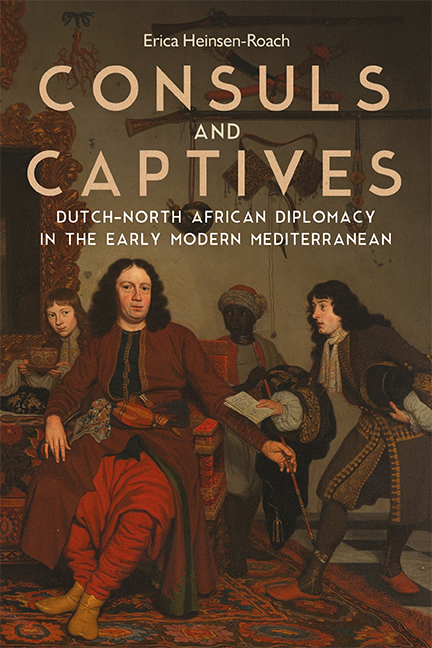3 - The Consul as State Representative
Published online by Cambridge University Press: 21 March 2020
Summary
In the hills of Pera, a quarter in Constantinople designated for foreign embassies, Ambassador Cornelis Haga pondered the conversations he had had with Ottoman officials. One of them was with Yusuf Dey, the newly appointed governor of Tunis. While waiting for transportation to the Maghrib, Yusuf had persuaded Haga to appoint a consul to serve in both Algiers and Tunis. The presence of a consul, Yusuf claimed, would give the Dutch Republic the authority to reclaim seized goods and negotiate the release of captives. A year earlier, Haga had commissioned Giacomo Belegno to liberate captives in the Maghrib. The failure of that mission (Belegno only received a few of the prisoners he claimed) probably convinced the ambassador that the distance between Constantinople and North Africa was too great to resolve issues effectively. He believed that a consul on site, equipped with commercial knowledge and linguistic skills, would be an excellent choice to represent the interests of the Dutch merchant community in the Maghrib. Referring to Yusuf as “right-minded and honest … unlike the usual Turks,” the ambassador thus endorsed the appointment of a consul to the States General “[who is] experienced in the Italian or Spanish language.” In response, the Dutch authorities appointed Wijnant Keyser as the first consul stationed in Algiers and Tunis.
The proposal to establish a Dutch consulate in Algiers and Tunis reveal how relations between Europe and the Maghrib had deviated from the course that traditional historiography on diplomacy prescribed. On the European continent, resident ambassadors took center stage in representing sovereigns and handling political affairs. They resided at foreign courts to handle disputes, renew alliances, or ratify treaties, and, just as important, to gather information. They functioned as honest spies, as Abraham de Wicquefort once observed. Resident ambassadors thus became the essential building blocks of diplomacy and embodied its professionalization. Consuls in Europe, as envoys promoting commerce, played no role here. Contemporaries usually regarded them as possessing neither the status, nor the rank, nor the duties of an ambassador.
But a history of early modern diplomacy that focuses solely on the role of the resident ambassador fails to capture the evolution of diplomacy in the western Mediterranean. The more modest position of consul in the Maghrib tells a different story, one more reflective of the actual situation.
- Type
- Chapter
- Information
- Consuls and CaptivesDutch-North African Diplomacy in the Early Modern Mediterranean, pp. 59 - 76Publisher: Boydell & BrewerPrint publication year: 2019



